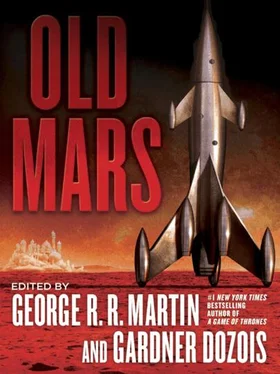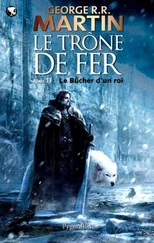The other method, a holdover from the pirates’ less egalitarian days, would be for one of the crew to challenge Jason to single combat, with the winner of the duel being the one who had proven himself fit for command. This latter method had seldom been used in recent generations, and never during Jason’s time as a pirate, in large part because the rules required that the combat must be to the death; but it was kept in the Articles as a tribute to the early pioneers who had risen up out of the waters and sought the freedom of the high sands, proving their worth not by persuasive argument but by the strength of their sword arms. It was the last vestige of a time before Freehaven had truly earned its name.
When Jason could see the ruins of the buried city from the deck of the Argo , it meant that they were almost home.
“Where is that beast of yours?”
Jason turned to see Tyr approaching. He had spent much of his time in recent days belowdecks tending to the needs of the Praxian refugees, leading them in recitations of scripture, sharing memories of happier days, and so on.
“You mean Bandit? I’m sure he’ll turn up sooner or later,” Jason answered. “He always does.” His leatherwing pet had flown off before their fight with the Praxian corvette, and Jason hadn’t seen him since. But it was hardly unusual. His “pet” was only one step removed from a wild animal and clearly valued its independence.
Tyr joined Jason at the railing and looked out over the buried city as it drifted slowly by. They could hear the muttering of some of the other crewmen, who still rankled at the presence of the Praxian “rabble” belowdecks.
“We were a better people once,” Tyr said to Jason in a low voice, glancing sidelong at the disaffected crewmen. “A great people. But the drought that dried our world, I fear, dried out the wellsprings of compassion in too many of us.”
When he had first arrived on Mars, Jason had been surprised to discover that the dominant life-form of a desert world was aquatic. But he had soon learned that, when life had first evolved on the red planet, Mars had been entirely shrouded in deep oceans. Complex civilizations had flourished in the ancient waters of Mars, vast city-states woven in a complex web of trade and cultural exchange.
But just a few thousand years before Jason’s arrival, that had all changed. The oceans had begun to recede, slowly at first, then more quickly with each passing year. Skeptics among the populace had argued that what they were experiencing was a natural cycle and that the waters had ebbed and flowed many times before. But the more forward-looking had seen what lay ahead if the seas continued to shrink. And they had a solution.
By the time that places like the buried city before them had been lost to dry land, a complex system of canals had been constructed, linking points of extremely low elevation where, it was hoped, the waters would be retained even if they disappeared from the rest of the globe. The populace relocated to these new sanctuaries, leaving their old homes behind but retaining as much of their former cultures as possible as they continued to exchange goods and ideas along the narrow canals that connected their new homes.
And for a few generations, it appeared that the worst was behind them. The oceans had receded drastically, but there were still waters in the canals and in the low-elevation sanctuaries. Life continued much as it always had, albeit under considerable strain.
But the drought that had dried their world had only slowed, not stopped, and in time some of the canals became shallower and shallower, until in the end they were no longer navigable by the aquatic residents of the sanctuaries. What had been a globe-spanning system that connected every living person on Mars became fragmented networks, isolated from one another, separated by the unforgiving sands.
Now all that remained of the once-proud globe-spanning culture were ruins like this buried city, where crumbling statuary, the spires of the highest roofs, and the tallest columns were all that rose above the sands, like an orchard of tombstones.
Jason looked from the ruins to Tyr, a solemn expression on his face.
“Your people can be great again, you know. If enough of you want it.”
The Argo had reached the anchorage outside of Freehaven, and while the crew prepared to leave the ship, Tyr led the refugees down the gangplank onto the stone docks, and from there down into the waters of the oasis. There were nearly a dozen other sand ships at anchor, nearly all of those who called Freehaven home, some of them in the process of unloading their most recent plunder, others preparing to sail out onto the sands again.
When the engineers of several millennia past had constructed the network of canals that connected the areas of lowest elevation, there were a handful of likely spots that were too far distant from the others to be included. One such was the lake the first pirates had named “Freehaven.” It was several days’ sail across the high sands from the nearest point in any of the canal systems, its location a closely guarded secret. Shielded from view by the ruins of the buried city to the east and by a mountain range that ran from southwest to northeast, it could be approached only from the south, and even then captains had to be careful to navigate clear of the many hidden baffles and traps that had been set by the inhabitants just beneath the sands. Any who tried to approach Freehaven without knowing the circuitous route to take would find themselves stranded out on the sands, their hulls shattered to splinters, at the mercy of the pirates’ defenses.
Jason was on deck, in the process of strapping on the complex breathing apparatus that allowed him to move through the streets of Freehaven without drowning. The building he called home was pressurized with breathable air within and air locks in place of doors, but with enough standing water in indoor fountains and pools that his native friends could visit him without running the risk of drying out or suffocating. But in order to reach his home, he had to pass for a considerable distance beneath the waters, as he did when he wanted to join in with the daily life of the Freehaven community.
So it was that Tyr already had the refugees over the docks and down into the waters by the time that Jason was able to join them, his ditty bag slung over his shoulder, a transparent globe-shaped helmet completely enclosing his head. The knee he had injured aboard the galleon was better but had not healed entirely, and so he was thankful to get underwater and take his weight off it.
Tyr had already removed his encumbering breather, and the refugees were glorying in the sensation of breathing freely for the first time since they boarded the Vendish galleon some weeks before.
“Finally!” A voice echoed through the material of Jason’s helmet, loud enough to carry through the waters. “You bring us something of value , pink-skin!”
Jason cupped one hand palm forward and the other palm back, and waved his arms to spin himself around in place. It was sometimes difficult for him to discern one Martian voice from another underwater, but he knew exactly who had spoken this time.
“Rac,” he said. Inside the helmet, the name sounded like a curse in Jason’s own ears. But his words were being picked up by a microphone beneath his chin and amplified through speakers incorporated into the outer shell of his breathing apparatus, at a volume that the natives could perceive, and he wasn’t sure if the venom in his voice was lost in the process. “How nice to see you.”
“That’s Captain Rac, I remind you.” The water before Rac’s face rippled with waves, the visual cue that his mandibles were clacking with laughter. He stood with his crew, who were in the process of preparing to put out to the high sands.
Читать дальше












